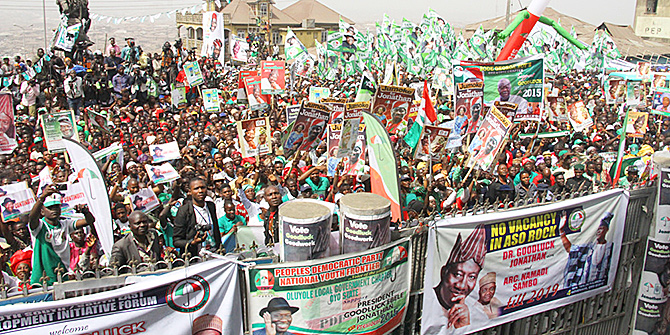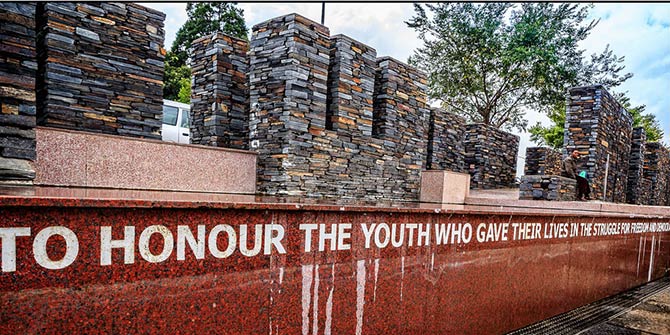Claire Mercer, Deborah James and Charlotte Lemanski report on the recent ASA-UK conference which explored some of the diverse research being done on the middle on the African continent.
Paradoxically, while in Europe and America the old middle class is declining, in the Global South its newer incarnation is on the rise. Interest in the ‘African middle classes’ as an identity-based group has exploded in recent years, becoming the contemporary buzz-topic for scholarly and public agendas. The media has demonstrated an ambivalent attitude towards this newly-emerging group. Is it the bedrock of political stability and democracy, or is it simply engaged in frivolous conspicuous consumption? Is it more useful to classify the new middle class using ‘objective grounds’ – that is people’s roles in the world of work and production or households’ capacity to consume – or should we take seriously the ‘subjective’ views of people themselves? Scholars are now increasingly aware of the limitations of economic-based quantitative analyses. Here, one could for example point to Thandika Mkandawire’s well-known critique of the African Development Bank’s (AfDB)’s $2-4 per day consumption-based criteria as a ‘stretch concept’[i]. However, there has been limited attention to more localised and historicised qualitative research. Such approaches could complement, or challenge, existing research to explore the everyday lived experiences of being middle-class for people living in the (often precarious) spaces between poverty and wealth in Africa.

At the 2016 African Studies Association of the UK (ASA-UK)conference held at the University of Cambridge, we convened four linked sessions that began to explore some of the diverse qualitative research that is being done on these issues. The sixteen papers by anthropologists, geographers, historians, political scientists and sociologists covered a broad range of issues, from re-defining ‘middle class’ in Africa, middle class practices of consumption in Africa, and middle class spatial practices and property ownership, to middle class performativity.
In the first session, Re-defining ‘middle class’ in Africa, Anna Fichtmüller (Sciences Po Bordeaux, France) offered a biographical approach to the middle class, drawing on her doctoral research in Uganda. The differences between her interviewees led her to question whether such diverse life trajectories can be meaningfully grouped into a ‘middle class’ category – indeed, it was not a term that they use to describe themselves, even though, she admitted, something is clearly going on.
Rachel Spronk (University of Amsterdam, Netherlands) also took a biographical approach to the Ghanaian middle class, but one which delved back further into family histories to consider class mobility across generations. For Spronk, the middle class is a ‘classification in the making’, and is made under changing historical circumstances.
Turning to Nigeria, Portia Roelofs’ (LSE, UK) paper considered the ways in which local politicians in Oyo State mobilised ideas of middle classness in order to nudge citizens’ behaviour in certain directions – in this case, to encourage roadside traders to submit to re-location in order to improve the public environment. Here, middle classness was equated with levels of education and understanding the need for ‘sacrifices for development’.
Finally, Carola Lentz (Johannes Gutenberg University Mainz, Germany) noted that the ‘middle class’ is not a straightforward category of analysis in Africa, not least because it does not have universal purchase across the continent in the ways that people describe themselves. We have to go beyond folk terminologies, she argued, although we also have to take them seriously. She suggested that key ingredients of middle classness include education (and respect), conceptions of work, political possibilities, and consumption. Lentz also argued that scholars should focus on the role of the state in making or breaking middle classes and the transnational, national, and local making of the middle classes.
The discussant, Roger Southall (University of the Witwatersrand, South Africa), opined that much contemporary research on the middle class was focussing on agency at the expense of structure, and made a plea for a return to the classic debates on class contained in Marx and Weber. For him, this means a focus on work – on people’s jobs and therefore their positions in labour markets. Southall appreciated the focus in the papers on education and inter-generational class mobility and picked up on Lentz’s argument about the significance of the state in making and breaking the middle classes. As an example, he compared the fate of the middle classes in South Africa against Zimbabwe.
The second session, Middle class practices of consumption in Africa, began with Deborah Durham’s (Sweet Briar College, USA) discussion of what cars and houses – two of the biggest areas of middle class consumption – tell us about changing norms of morality and kinship in Botswana. Cars, for example, might signal individualised consumption, but they can also be filled with people (one’s neighbours or kin, for example). And yet, car ownership, fuelled by credit, is not a stable middle class signifier, if neighbours know that the driver has no decent house to sleep in.
Cheryl McEwan (Durham University, UK) challenged the characterisation of the middle classes as predatory consumers based on her research (with Alex Hughes and David Bek) looking at the practice of thrifty consumption as a key marker of middle classness in the Western Cape, South Africa.
Also in South Africa, Fawzia Mazanderani (University of Sussex, UK) discussed the ways in which students in Mpumalanga internalise individualised discourses about how to achieve their aspirations. Max Bolt (University of Birmingham, UK) focused on inheritance and will making in South Africa as formal processes of state surveillance that are significant for middle class reproduction.
Charlotte Lemanski (University of Cambridge, UK), acting as discussant, drew the four papers together by raising the question of a collective versus individual approach to analysing consumption, for example considering how individual consumption practices have collective consequences, particularly in terms of passing class-ness to future generations (morally and materially). She concluded by reminding the audience of the diversity of the middle-class experience, meaning that there is no universal singular middle-class identity.
In the third session, Middle class spatial practices and property ownership, Claudia Gastrow (University of Johannesburg, South Africa) focused on the history of state intervention in housing policy in Luanda in order to show how the state has been a key maker of the urban middle classes in Angola. Claire Mercer (LSE, UK) argued that the middle classes in Dar es Salaam both shape, and are shaped by, the suburbs that they build incrementally.
Thabisani Ndlovu (Walter Sisulu University, South Africa) looked at the use of humour by the middle classes in South Africa to deal with the anxieties that spring from ‘shuttling between the suburb and the township’. Charlotte Lemanski examined the middle class in South Africa as a precarious group, caught between different categories of state housing policy. In her discussant comments, Carola Lentz noted that housing was a fruitful window onto emerging social stratification in Africa, both in material and aesthetic terms.
In the final session, Middle class performativity in Africa, Lena Kroeker discussed the ways in which Kenya’s urban middle classes in Nairobi deal with the constant threat of downward mobility. In one of the few contributions to explicitly address the question of land, Nkululeko Mabandla (University of Cape Town, South Africa) showed how land ownership has been central to class reproduction across generations in Mthatha.
Jason Musyoka (University of Pretoria, South Africa) compared the changing role of the apartheid and the post-apartheid South African state in enabling white, and then black, middle class formation. In the final paper, Elizabeth Hull (SOAS, UK) looked at nurses in KwaZulu-Natal to explore the work that goes into the making of a professional (state-employed) class identity. Deborah James (LSE, UK), acting as the closing discussant, noted the contradictory nature of the middle class project in Africa, which she said was characterised by the gains and losses of obligation and independence, solidarity and individuality.
It is difficult to coherently summarise and synthesise across 16 rich empirical papers dealing with different aspects of middle class experience across sub-Saharan Africa. Indeed, the question of whether the issues under discussion could be captured under the sign of ‘the African middle class’ arose frequently during the papers and the ensuing discussions. As Carola Lentz pointed out, there is no specifically African middle class, rather a series of global middle class trajectories that play out in different places under historically specific circumstances.
What was extremely welcome in this set of papers was a shift away from a mode of analysis inspired by the African Development Bank and others that asserts that the middle classes are simply those in the middle of the income distribution. Rather, by taking a more ethnographic approach, the papers were able to breathe some life into our understanding of what middle classness means to people.
There was, for example, an emphasis on forms and meanings of middle class consumption – of housing, cars, education, and of practices – such as will-making, building, working, and dealing with anxiety. In the papers that took a long view or an inter-generational approach, participants were given some sense of how class is reproduced over time, while the meanings of middle classness have changed significantly. In some papers the role of the state was central to the making of the middle classes, either through providing access to housing or certain forms of work, or in more subtle ways, such as through encouraging distinctions between those who ‘understand’ and are therefore progressive, and those who do not, and are not.
Yet in a continent where the majority of the population still lives in rural settings, it was striking that most of the papers were describing urban contexts and only few contributions addressed questions of land. Overall, however, the four paper sessions provided a rare opportunity for an extended inter-disciplinary discussion about what middle classness means in contemporary Africa.
This article was first published on the Global Middle Classes blog.
Claire Mercer (@clairecmercer) is an Associate Professor Department of Geography and Environment at LSE.
Deborah James (@djameslse) is a Professor in the Department of Anthropology at LSE.
Charlotte Lemanski is University Lecturer in the Department of Geography, University of Cambridge.
The views expressed in this post are those of the author and in no way reflect those of the Africa at LSE blog or the London School of Economics and Political Science.






1 Comments